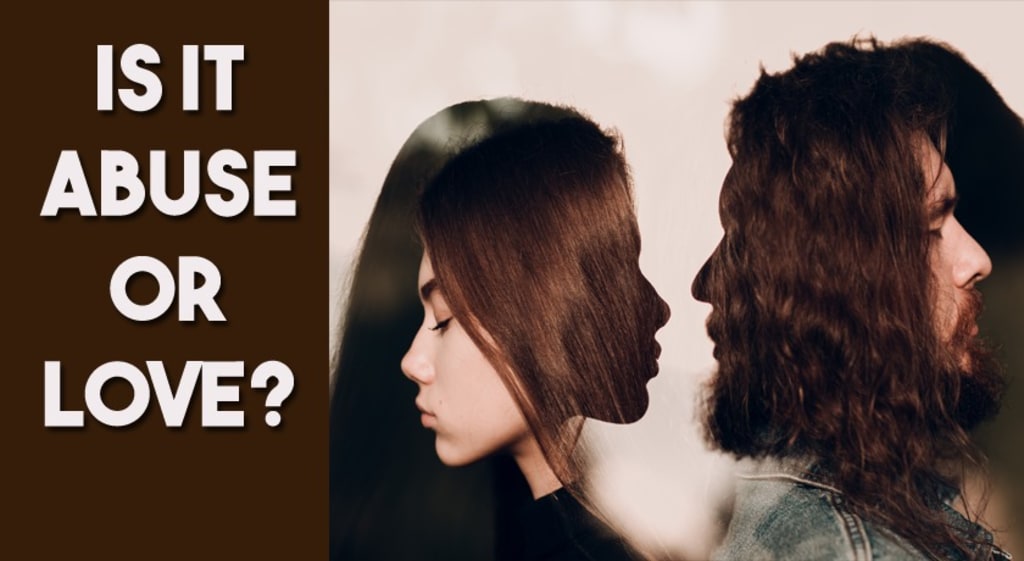
More than 3 million incidents of domestic violence are reported each year, including both men and women. Nearly 20 people per minute are physically abused by an intimate partner in the United States. During one year, this equates to more than 10 million people. One-third of women and one-fourth of men will have experienced some sort of interpersonal violence, and for one-fourth of women and one-seventh of men, it's severe. What is less talked about, though serious, is emotional abuse that ranges from withholding to controlling, and includes manipulation and verbal abuse. The number of people affected is astronomical. Emotional abuse is insidious and slowly eats away at your confidence and self-esteem. The effects are long term, and can take even longer to recover from than blatant violence. We hear from many people who are in abusive relationships, and even those who have left relationships, but say that they love their abusive partner. They wonder, “Why do I love someone who has hurt me so much?” It can feel strange, confusing and even wrong to love someone who has chosen to be abusive. While these feelings can be difficult to understand, they aren’t strange and they aren’t wrong. Love isn’t something that just disappears overnight. It’s a connection and emotional attachment that you create with another person. Love comes with a lot of investment of time, energy and trust. It’s not easy to just let go of a life you’ve built with someone, whether they’re abusive toward you or not. What starts off as well intentioned forgiveness turns into forfeiting your life for someone who is never going to be capable of being a truly healthy partner. Controlling, abusive partners need help. You are worth more in this life than waiting for their sickness to get better. You are worth a partner that respects you exactly as you are. You are worthy of a partner that does not control you or force you to hide parts of who you are. What if you even had a partner that was there to be a catalyst – even to your own personal growth in a healthy way? Imagine how far you could go in your life by shedding what is dragging you down. The longer you stay, the more difficult you will find the truth something you believe. Experiencing abuse will eventually rob you of your self-worth. Being the victim in these relationships can cause you to think, “If only I had dressed better, or cleaned the house better, or been more affectionate… then maybe the fight wouldn’t have started.”
You should never think this way. If you had done everything perfectly the fight still would have started. The abuse still would have happened. Your partner is fighting something in themselves not of you, but taken out upon you. Nothing you do or don’t do can fix them or prevent this from happening again. You are not in control of this situation no matter how wonderful you are to them. Even if relationship never gets physically abusive, emotional abuse can escalate over time with devastating consequences, even death. And while emotional abuse does not always lead to physical abuse, physical abuse in relationships is nearly always preceded and accompanied by emotional abuse.
We mainly hear more about emotional abuse and why don’t we hear more about emotional abuse? In addition to the common misconception that it’s just not that serious, many people simply aren’t sure what emotional abuse actually entails. Understanding emotional abuse is complicated for many reasons. One reason is because there are several different names used interchangeably to refer to the same kind of abuse, including emotional abuse/violence, psychological abuse/violence, and mental abuse. For simplicity, we’ll use “emotional abuse” going forward.
Another complication is that there isn’t one accepted definition of emotional abuse. It seems that everyone has a slightly different version. We’ve identified several common threads that make up the most widely accepted definitions and combined them here to create the following description of emotional abuse:
Emotional abuse is any abusive behavior that isn’t physical, which may include verbal aggression, intimidation, manipulation, and humiliation, which most often unfolds as a pattern of behavior over time that aims to diminish another person’s sense of identity, dignity and self worth, and which often results in anxiety, depression, suicidal thoughts or behaviors, and post-traumatic stress disorder (PTSD).
Healing from any form of abuse takes time, effort, and diligence in searching out the truth. Hope rests within the truth. I realized in my life that I didn't know I was being abused. I didn't know where to turn or even how to find the answers. I needed someone to help me but I didn't even know who to turn to or trust. This is why Beyond My Life exists. To help people discover where to turn, how to get help and even what questions to ask. It is about discovering if you have things like PTSD or if you've been a victim of narcissistic like behavior or even parental alienation. It isn't about finding your identity within the diagnosis, but it IS about realizing the truth about what happened to you. Once you start to realize it, then you can start to heal.
Not everyone has their life threatened by an abuser, but many do. Our journey's are all different but one thing remains the same...we all want to heal and be able to move past the hurt and shame and to find life again.
It’s important to know the signs of an abuser. Often it’s hard to tell in the beginning of a relationship if someone is abusive – many times abusers are extremely charming at first. As the relationship gets more serious however, these red flags will show up and it’s important to recognize that they are signs of an unhealthy and abusive relationship. If your partner shows unreasonable jealousy, makes you feel stupid, insults and criticizes you, destroys property in anger, or prevents you from going to school, work, or seeing your friends, than this is warning that you should get out of the relationship before it progresses into even worse abuse.
It’s also crucial to understand that abuse is a very easy pattern to fall into. Once you’ve been treated like dirt by somebody who’s supposed to love you it’s easy to accept that treatment again from somebody else. It can be hard to differentiate fact from fiction when you’re with a partner who has engrained into your mind that you’re worthless. You are not worthless. You are incredibly special and loved but it’s easy to be blinded of that by someone who wants to control you. This is why it’s so important to get out sooner rather than later – because the longer you stay, the longer you will be convinced that you don’t deserve to leave.
In order to get out of the cycle of abuse, whether it be the same abuser or just the same type of guy, you’ve got to hold on to your self worth. A healthy relationship REQUIRES respect, trust, and open communication. Respect yourself first by demanding these things in a relationship. If your partner violates these requirements – respect yourself by removing yourself from the relationship.
Getting out of an abusive relationship is the most dangerous part. For this reason, be prepared with a plan. The best way to get out of an abusive situation is to reach out to your family, friends, or if you are isolated from these people which many abused spouses are, you can reach out to a women’s group, a church, or even your doctor. If you let others know about your situation and your concerns, we can and will help you get to safety.
Abusers are somewhat aware of what they are doing some of the time. There are different layers of consciousness that play out during abuse. Usually the abuser's mind is involved with thoughts of either revenge or condescension, both of which can be somewhat justified, at least momentarily. But it's a complex process.
Oddly, our subconscious seems to be without morals in its efforts to protect us from emotional harm. It is somewhat militaristic in its goal for us to attack whenever our emotional security is threatened. It is our social conditioning, our personal ethics regarding the treatment of others, and our ability to keep calm that allows us to ignore the subconscious' wish that we lash out when we feel threatened.
People who engage in abuse are usually those who are so oversensitive that their emotional security is threatened by normal social interaction. If they consider sensitivity to negative judgment to be a weakness that others will look down on, any time this sensitivity is triggered they will feel ashamed. Abuse allows them to escape the shame, but the route they take from shame to blame has a lot of twists and turns:
The subconscious, when it senses the threat of rejection that might cause painful humiliation, will wage a campaign aimed at getting the conscious mind to agree that an attack should be launched preemptively, based on fear of threat alone, before we receive actual negative judgment.
There are two obstacles that the subconscious must overcome in order to convince the conscious mind to attack without actual cause.
1. Society's beliefs about the treatment of others.
2. Personal ethics about the treatment of others.
The subconscious will attempt to overcome these challenges by manipulating the conscious mind using emotions, very much like the tactics of politicians during a negative political campaign. This is accomplished by feeding to the conscious mind thoughts that heighten suspicion enough to justify an attack. The subconscious also might use thoughts of condescension or superiority or thoughts of victimization that call for revenge to overcome our social inhibitions about abuse.
If the person does not share society's beliefs about abusive, it will be very easy for the subconscious to navigate past these hurdles. For people who are ambivalent to society's rules about abuse the subconscious can take advantage of loopholes that exist in society's belief in human equality that may allow certain people to be thought of as inferior. The subconscious will then use those loopholes to convince the conscious mind that the rules don't apply in this case.
If on the other hand a person has strong adherence to society's rules and a strong personal ethic about abuse, the subconscious may try to use stronger tactics such as raising the emotions to such a high level that reason and rationality are no longer in place. This can be done by feeding in paranoid thoughts or thoughts that convince the conscious mind that they have been victimized to the point where personal vigilantism is called for.
The result when the subconscious is successful is a conscious mind that is unaware that this manipulation has taken place, is believing that the thoughts are its own, and is taking what it believes to be appropriate action.
About the Creator
Alexis Sharde
Hello! I'm a mother of four beautiful children and wife of five years. I am pretty pokey (nosey as some would call it) and not to mention, I have lived an decent but "hard knock life" (as some would call it) lol. So why not write about it?
Enjoyed the story? Support the Creator.
Subscribe for free to receive all their stories in your feed. You could also pledge your support or give them a one-off tip, letting them know you appreciate their work.






Comments
There are no comments for this story
Be the first to respond and start the conversation.